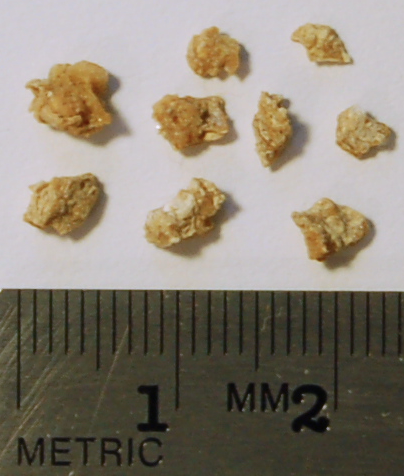Stones in the River

The kidney stone was probably one of the very first illnesses ever recognized by humans. This is funny because in some respects we're still treating them the same way that we did six thousand years ago.
The kidney stone was probably one of the very first illnesses ever recognized by humans. This is funny because in some respects we're still treating them the same way that we did six thousand years ago.
If you've ever had a kidney or urinary stone -- nephrolithiasis or urolithiasis, in medical language, depending on where the stone is at the time -- then you don't have to be told that it's moderately unpleasant. In fact, in spite of the old saying that childbirth is the most painful experience known to humanity, women who have experienced both kidney stones and childbirth have on occasion reported that the two pains are of about equal intensity, but obviously, this is highly subjective and not really something we can prove one way or another. We do know this: the pain of a kidney stone can be (although isn't always) so bad that people will do nearly anything to stop it, and this may be why the evidence suggests that one of the very first surgeries ever invented was to remove them. From this, we learn two things: that human are endlessly and sometimes self-destructively creative, and that you should never underestimate what a desperate person might do to make pain go away.
The history of kidney stones goes back at least as far, if not farther, than the recorded history of humanity. Stones have been found in the urinary systems of Egyptian mummies going back some four to five thousand years. This alone wouldn't be terribly interesting; after all, we can safely assume that ancient Egyptians were dying of cancers, too, but since no one knew about them, they probably weren't much cause for concern. We know that ancient civilizations knew about kidney stones because there are records of treatments for them. Egyptian, Mesopotamian, Indian and Greek texts from well before the Roman Empire detail, not merely the existence of stones, but possible causes of their formation and various treatments. Various diets and herbs were supposed to be able to either treat or prevent stone formation -- some of which probably worked -- but we also know that stones were treated with surgery. The Hippocratic oath is thought to specifically refer to this problem when the physician swears to "not cut for the stone, but... leave that entirely to the surgeons," although by this time other diseases were also known to be due to stone formation, and it's possible that the oath is meant more generally.
In the twenty five hundred or so years since Hippocrates, the surgery to remove a urinary stone underwent some evolution and refinement, but by and large didn't change hugely. The most significant advancement since those days was during the Renaissance, with the realization that with the proper tools, a stone could potentially be broken down into pieces small enough to pass through the urinary system without actually making an incision or opening the body. This non-surgical technique didn't really come into its own until the invention of ultrasound, which allows us to destroy some stones with sound waves transmitted right through the body wall. Even today, however, with all the tools available to us, about one in twenty people with significant kidney stones still require true surgical treatment.
Kidney stones are an interesting example of a disease which a storyteller might decide can't be treated with standard curing spells. A kidney stone causes pain when it gets lodged in part of the body's plumbing, and strictly speaking, in that situation, there isn't anything wrong with the body itself. A storyteller might rule that curative magic somehow "knows" that the stone is a problem and can therefore destroy it, but if that's true, then should the same spell be able to dissolve an arrow that's stuck in someone's shoulder? A storyteller might rule that instead, to treat a stone stuck in the urinary system, a healer has to cast a spell that targets inanimate matter, such as Shatter, or for the truly daring, Transmute Rock to Mud or Stone to Flesh, spells whose long-term effects on the body I hesitate to imagine. A system like this can make healing much more interesting in a campaign, because a the healer has to not only know a greater variety of spells, but also has to be able to identify the right spell to use for the illness.
More than four years ago, Dr. Eris Lis, M.D., began writing a series of brilliant and informative posts on RPGs through the eyes of a medical professional, and this is the one that appeared here on November 29, 2014. Lis is a physician, gamer, and author of the Skirmisher Publishing LLC OGL sourcebook Insults & Injuries, which is also available for the Pathfinder RPG system.






